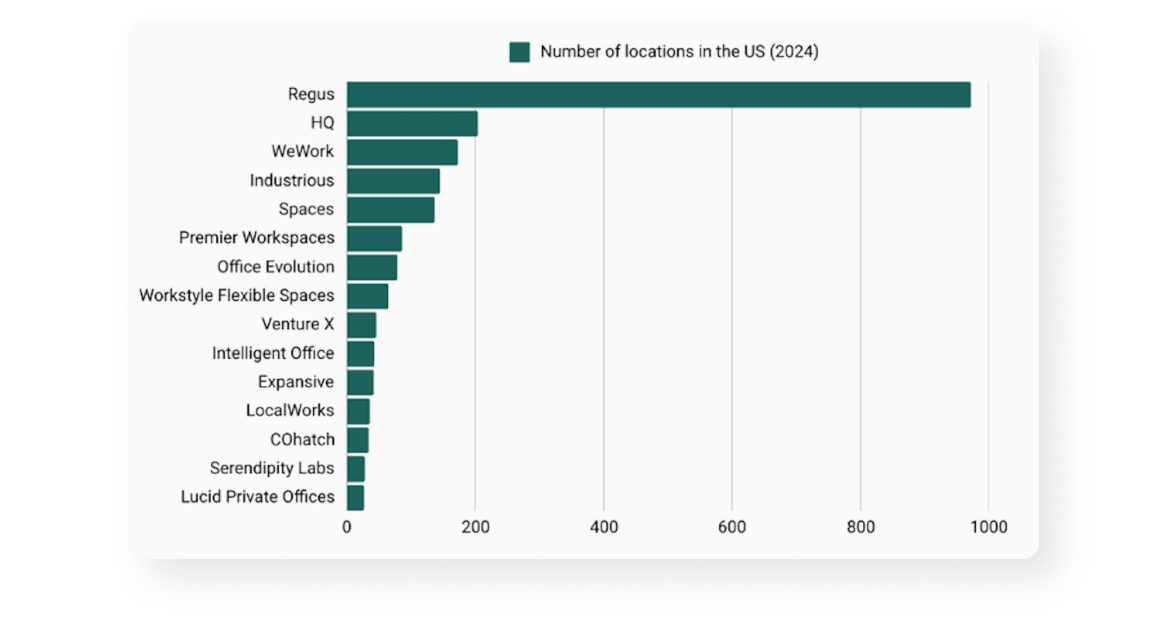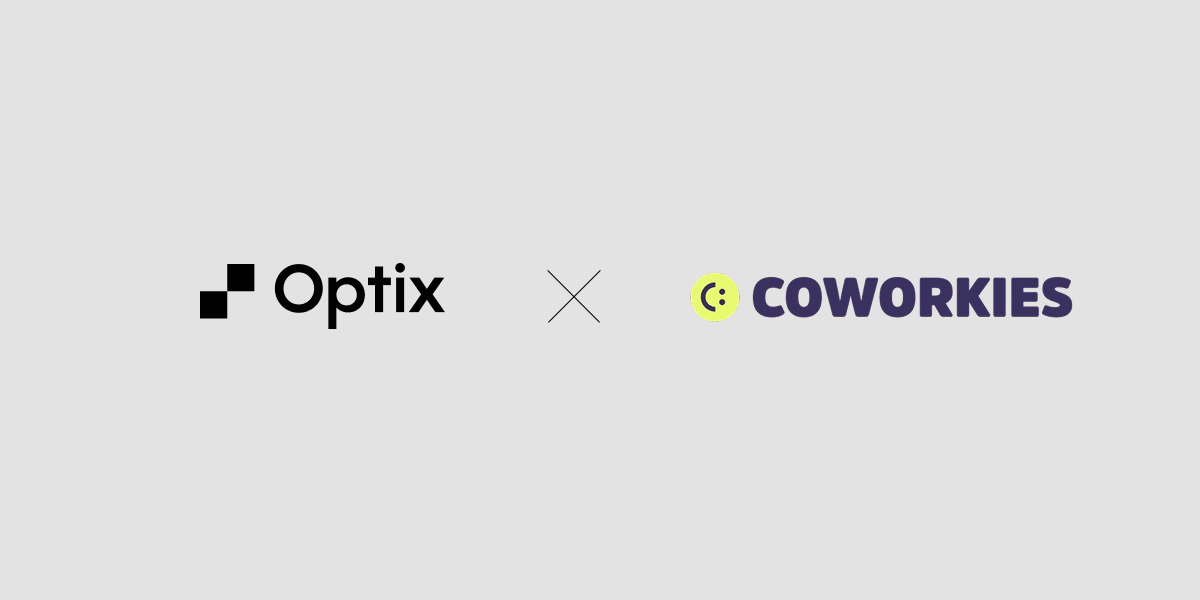
Last updated: October 7, 2025
As of 2024, there were around 8,000 coworking spaces in the US alone, representing a 7% increase quarter over quarter according to Coworking Cafe. But which companies came out on top? To answer this question, we’ll use data from Coworking Mag and Allwork.space.
Here’s the list of the top 15 coworking spaces in the US in order of largest to smallest:
- Regus
- HQ
- WeWork
- Industrious
- Spaces
- Premier Workspaces
- Office Evolution
- Workstyle Flexible Spaces
- Venture X
- Intelligent Office
- Expansive
- LocalWorks
- COhatch
- Serendipity Labs
- Lucid Private Offices

1. Regus
Year established: 1989
Number of locations: 972
With over 950 locations, Regus is by far the largest coworking organization in the United States and one of the largest coworking companies globally. Owned by IWG, they are best known for their professional spaces that target a more mature audience.
2. HQ
Year established: 1989
Number of locations: 204
HQ operates over 200 locations across the US making it the second largest coworking company in the United States. They offer coworking spaces, meeting rooms, and offices to meet the needs of professionals and entrepreneurs across the country.
3. WeWork
Year established: 2010
Number of locations: 173
One of the most infamous names in coworking, WeWork is the third largest operator of coworking spaces in the United States with over 170 locations. They’re known for their beautiful locations, unique amenities, and millennial-driven culture complete with kombucha on tap and ping pong tables in the foyer.
4. Industrious
Year established: 2012
Number of locations: 145
With close to 150 locations in the US, Industrious is a big name in the US coworking market. Recently acquired by CBRE, Industrious is the most formidable competitor to WeWork within the coworking world with fresh spaces that evoke creativity and a sense of community.
5. Spaces
Year established: 2008
Number of locations: 137
Also owned by IWG, Spaces operates 130 locations across the US with locations across all major US cities. All memberships are all-inclusive, open 24 hours a day year-round, have multi-location access, and flexible terms.
6. Premier Workspaces
Year established: 2002
Number of locations: 86
Premier Workspaces offers over 80 locations across several US states with roughly three-quarters of those locations in California. Their offices cater towards a professional member base offering services and amenities for a mature audience.
7. Office Evolution
Year established: 2003
Number of locations: 79
A recognizable franchise in the US coworking market, Office Evolution operates around 75 locations across the United States. They offer office space and coworking as well as virtual office plans for members.
8. Workstyle Flexible Spaces
Year established: 2013
Number of locations: 65
Workstyle Spaces operates over 60 locations across the US, making them one of the largest coworking companies in the country. Unlike some of their counterparts, they are concentrated in smaller cities including Houston, Chicago, and Atlanta.
9. Venture X
Year established: 2012
Number of locations: 46
With close to 50 coworking locations in the US, Venture X offers a premium coworking experience to professionals and entrepreneurs. Their spaces are a blend of modern office styles and boutique hotels that look to help entrepreneurs take their business to the next level.
10. Intelligent Office
Year established: 1995
Number of locations: 43
Close behind Venture X is Intelligent Office with just under 50 locations in the US. Though operating physical locations, they lean heavily into their virtual office services including call answering and virtual admin services.
11. Expansive
Year established: 2012
Number of locations: 42
Expansive is a coworking company with roughly 40 locations scattered across the United States. They serve many enterprise corporate clients including Uber, Starbucks, and Coca Cola according to their website.
12. LocalWorks
Year established: 2012
Number of locations: 36
LocalWorks operates 35 locations across a few east-coast US cities including Washington DC, Chicago, and Boston. They primarily offer private offices and conference and meeting rooms rather than open coworking.
13. COhatch
Year established: 2016
Number of locations: 34
With around 35 locations, COhatch is one of the largest operators of coworking spaces in the United States. Their locations are spread across eight major US cities, and their focus is primarily on community…and fun.
14. Serendipity Labs
Year established: 2011
Number of locations: 28
One of the better known brands in the US coworking market, Serendipity Labs operates just under 30 locations in the US. They service a variety of enterprise clients along with professionals looking for a calm and productive environment.
15. Lucid Private Offices
Year established: 2001
Number of locations: 27
Rounding out the list with 27 locations across the US is Lucid Private Offices. Primarily in the Dallas and Houston area, they offer upscale private offices at an affordable price.
The US coworking market is evolving quickly
As the coworking industry continues to evolve, the largest players in the U.S. market are setting the pace for innovation, efficiency, and experience.
While industry giants like WeWork, Industrious, and Regus dominate in scale, independent operators have unique opportunities to differentiate through localized community building, personalized service, and niche offerings.
By leveraging technology, refining operations, and fostering strong communities, coworking space owners can carve out a strong position in this dynamic and rapidly expanding market.
Marketing Manager
Kelly Karn is the Marketing Manager at Optix coworking software. She's been covering the latest and greatest in the world of coworking for 4 years and is one of the leading voices in coworking content having written over 300 articles. You can find her work on Coworking Insights, Coworking Resources, Allwork.space, DeskMag, GCUC, and (of course) the Optix blog.
Frequently asked questions
Coworking companies are growing quickly in the U.S. because businesses and freelancers increasingly prefer flexible workspace solutions over long-term leases. The coworking model offers agility, community, and cost efficiency, making it ideal for today’s hybrid work culture. For operators, this means more opportunities to serve diverse user needs and scale through tools like Optix that streamline management and member experience.
Independent coworking operators can compete by focusing on community, personalization, and niche experiences. Unlike national brands, smaller coworking spaces can build strong local networks, host tailored events, and adapt quickly to member feedback. Using flexible management software like Optix helps independents match the operational efficiency of big players while maintaining their unique local edge.
The biggest coworking companies — from Regus to Industrious — succeed because they combine professional design, consistent service, and scalable systems. Smaller coworking operators can learn from these models by implementing flexible memberships, improving branding, and leveraging workspace management tools to deliver a consistent experience across multiple locations.



